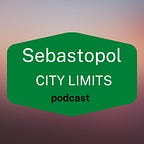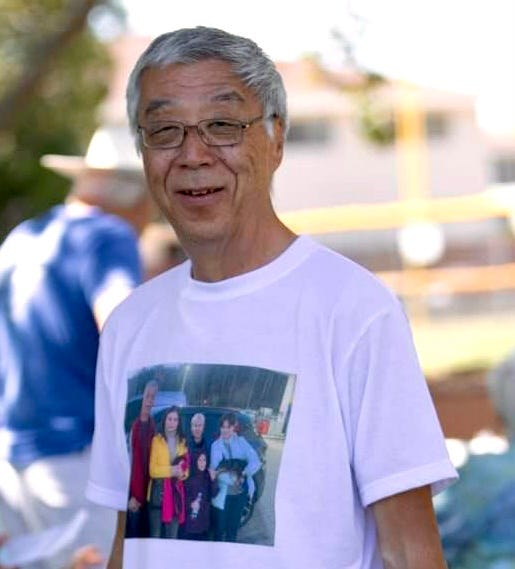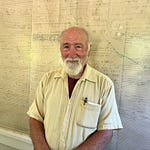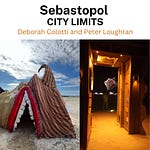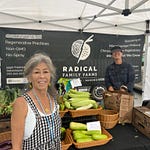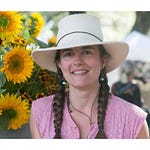Since John Namkung retired as an administrator of special education services in Sonoma County, he’s been involved in several humanitarian missions abroad. Earlier this year, John went to Poland, weeks after the Russian invasion of Ukraine had created a flow of refugees out of Ukraine. He helped at the border for two weeks transporting families by car for three hours to Kraków where they might then go to other parts of Europe.
One of the families he met shared their contact information with him, and later on, he offered to sponsor them, the Stetsenko-Kulyk family — a grandmother, mother and two daughters — and bring them to Sonoma County to live. John has organized a local group to help provide support for this family — the Lone Pine Ukrainian Family Aid, named after his neighborhood in Sebastopol.
I talked to John about how that all happened in this episode of the podcast.
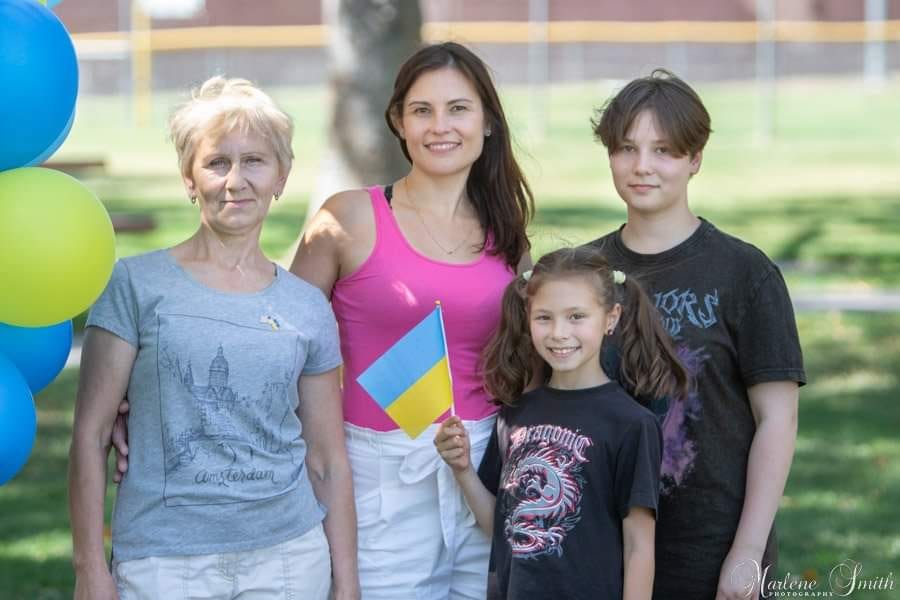
This Saturday, there’s a Ukrainian music concert that serves as a fundraiser for the family as well as for additional relief efforts in Ukraine. Here is some information on the benefit concert. Details here.
A golf tournament is also planned for October as a fundraiser. Details here.
Transcript
Dale: Welcome to Sebastopol City Limits. I'm Dale Dougherty, and I'm joined today by John Namkung, who's been involved in Ukrainian relief efforts. We're gonna learn more about a fundraiser happening this month and other activities. John, welcome to the podcast.
John: Thanks. Thanks for having me.
Appreciate it.
Dale: Hey, give us a little background about who you are.
John: Okay. I've lived in Sebastopol for 30 years. My career is mainly in the area of special education. I was a teacher and then I was an administrator in Santa Rosa city schools and out of Sonoma County of Education where I was administrator, directed special education programs throughout the county. I retired in 2009 and since then I've been involved in numerous volunteer activities, trying to keep busy.
Dale: Tell us about this event that's coming up, when it is and why people should go to it.
John: So next Saturday on September the 24th from 2:00 to 4:00 PM, there's going to be a Ukrainian music and dance concert put on by a group from the Bay Area.
Numerous Ukrainian musicians and dancers and folk music and so on. It's a really good opportunity for people up here in the North Bay to experience Ukrainian arts and culture. We rarely get a chance to see that up here.
We're doing a fundraiser for two things. One is the organization that's putting it on is raising funds to send to Ukraine for relief efforts. And then also I'm involved in sponsoring and supporting a Ukrainian family that came here to the United States on August the 11th. And I'm sure we'll talk about that more, but yeah.
Dale: I'll put some links below to information about how to get tickets and find out more about the event.
Let's go back to earlier in the year, you made a trip to the Ukraine, or to Poland actually.
John: Back in the end of March I decided to go to Poland, try and help the Ukrainian refugees and do what I can. Like many of your listeners we all saw the images of the millions of mostly Ukrainian women and children escaping from the war and going to other parts of Europe.
And I was compelled to go there and do what I could to help the situation. And I'd actually gone to Northern Greece back in 2016 when the Syrian refugees were migrating to Western Europe. And so I had some experience working with refugees. Then 2019, I went back and helped at a refugee camp for a population of Yazidi refugees from Iraq.
So when this happened, when the war broke out in Ukraine, I had some experience as far as going overseas and working refugee camps and so on. I just felt like I had to do something. I couldn't sit around, watch the suffering that was going on. So I went to Poland in March.
Dale: Did you need permission to do this or did you just go? Or did you work with an organization?
John: So I looked for an organization that I could hook up with once I got there because in 2016, when I went to Northern Greece, I just went on my own and once I got there, I looked for a group to join, which is okay, but it's not the best way to use your time.
So I found an organization here in the United States called Type of Wood Charities, a small nonprofit group in Idaho. What they were doing, they're transporting refugees at the border of Poland and Ukraine and transporting these families to other parts of Poland mainly to Kraków, a city in Poland.
And so I contacted them and asked if they needed any volunteers and they said, yes. So with that I bought my ticket and made my reservations and went there and then hooked up with them once I got there.
Dale: Talk about what you did, actually.
John: I was at the border of the two countries. There were several refugee centers. As soon as the Ukrainians crossed the border into Poland, they were bused to these large refugee reception centers where they were processed and had a chance to rest and get some food and before moving on. What we would do is announce that we were available to transport families. And so I would wait at the refugee reception center and we would announce that I had a car. I had a rental car, this SUV and room for four passengers and then wait for a family to come looking for a ride. And once that occurred and I would take them in my car. It was about a three-hour drive from the border to Kraków.
My hotel was at the border. So that meant, it's a six hour round trip for me. Each day I would take a family into Kraków and then I would have to drive back to my hotel. It's about 320 to 350 miles a day of driving. I particularly liked this experience because I got to know these families over a period of three hours and got to talk with them either through a translator or if they spoke English. I really got to make a connection with them.
As opposed to previous experiences. I would maybe serve food in a food line, which was all very important, but you never get a chance to connect with people. And so this was a really good experience.
Dale: And they were particularly vulnerable. They've just crossed the border.
They're getting a little help, but how do they know where to go?
John: Some of them already knew they had friends or relatives in a certain country. But many of them didn't. They would end up in these refugee reception centers and just stay there for days or weeks so they could figure out a plan of where to go.
And others just went randomly into Poland, Moldova and Hungary for a place to stay. So yeah, they were very vulnerable once they crossed the border. The other issue that was very important is human trafficking. When the war started, because these were mostly women and children. Very few men could leave Ukraine. These human traffickers would come out in force and offer rides and a place to stay, et cetera. And unfortunately there were women and children who were, who were kidnapped and taken by human traffickers. So when you think of what they already went through with the trauma of war and leaving their home and family and then being preyed upon that was a major issue, major concern. And fortunately the Polish government where I was took this seriously and they put into place controls where if a driver wanted to take someone, if I wanted to take a family, I'd have to give them my passport and my driver's license of the car, etc. When we left the reception center the police would check that information to make sure that there's a right number of people and who was in the car, et cetera.
And so that helped alleviate some of the concerns. Not totally, of course. But yeah, things were very difficult, I think, for these families once they crossed the border. I'm sure they were very elated and grateful that they were safe, that they were out of harm's way. But at the same time, if you can imagine not knowing where you're going and how you're gonna get there. And all these other fears and ...
Dale: I've had opportunity to talk to some Ukrainian refugees and they didn't know how long they would be out of their country whether this would be quick or, as it's turned out, it's taken months, I think we just passed a couple hundred days in this war.
John: Yeah, exactly. That was one issue. And then later on, after I came back to the states the flow of refugees leaving Poland into other countries I slowed down considerably because certain parts of the country were liberated and no longer in danger. And most of the fighting is occurring in the east.
And in the south, as so other parts of Kyiv the capital and Lviv, and some of these other cities currently are relatively safe. And so a number of refugees have returned to Ukraine because of their situation. In fact, there, I think there are probably more people returning than leaving now.
So yeah, it all depends on the situation with the war.
Dale: Now you met this family that you were working with that they were one of the groups that you transported from the border?
John: They were the second family that I met and I was particularly struck by the fact that there three generations of females. There's a grandmother, a mother, and two daughters.
And I'd like to kid around and say that they had a dog and the dog is also female. So very brave, courageous, strong females to do what they're doing. And so I met them at the border and I transferred them to Kraków. As I said goodbye to them, they're going to Germany the next day, I said keep in touch. Let me know if you make it to Germany. Okay. Et cetera. And so the mother Iryna gave me her Facebook identification. Facebook messenger name. And I just took it down and not knowing if I will ever see them. Actually thinking that I'd never see them again.
All the other families that I transported over those two weeks I never got their contact information. So when I returned to the States, President Biden started this program called Uniting for Ukraine, which allowed 100,000 Ukrainians to come to the United States for up to two years, as long as they're sponsored by an American, someone in the United States.
So I decided to do that because I wanted to keep helping in some way the Ukrainians. In the application for this Uniting for Ukraine, you have to specify the name of a Ukrainian. You can't just say I want to be a sponsor. So the people that I knew were Iryna and her family, because I had the contact information.
So I texted her and asked, would you be interested in coming to the United States? And they were actually on their way to Canada. But she decided to come to the United States, I think partly because she knew me. She had met me and I think had a certain level of trust.
Initially, I think she said she was a little nervous cause she only met me once and but she felt that I could be trusted. And so she said, yes. And then that started the whole paperwork process,
Dale: Right. So you had to fill out forms for humanitarian parole.
Yes. It actually happened fairly quickly though.
John: I was actually shocked knowing something about government bureaucracy. And I know other refugee groups have had just a long wait, a year or more to be vetted to come to the United States. So I submitted my application to be a sponsor and was approved within three days, which I just felt that was amazing.
And then they had to submit their application from their end, identifying me as a sponsor. And it took them two days to be approved. So the whole process in terms of the paperwork happened over a period of five days. There were a lot of other delays that had nothing to do with the paperwork, but before they could actually arrive here. But as far as the sponsoring part of it was relatively quick and smooth.
And I know, there might be some listeners out there who are maybe interested in becoming a sponsor. And I said, people contact me and I'm happy to give advice and suggestions. If anyone's interested on how to do this quickly and efficiently.
Dale: Once you did that paperwork then you had to schedule their arrival in the United States or plan that process.
John: And the thing that took a long time like three months or so, part of it was I had to raise enough funds to sponsor and support this family for up to two years. Living in Sonoma county is not inexpensive. Housing, et cetera is very expensive. So I started a group of my neighbors here who were in the part of Sebastopol off Lone Pine Road. We called ourselves the Lone Pine Ukrainian Family Aid group. Just a handful of people decided we're going to raise funds. We're going to support this family.
And gradually this group expanded beyond our Lone Pine area. Other friends and neighbors and pretty soon, and through email groups and GoFundMe groups, we probably had 125 to 150 people respond with either donations or offers of housing, transportation, food, furniture, you name it. People just came out of the woodwork.
And so we had made a goal that we're not going to bring the family over until we'd raised a certain amount of initial funds, which is about $50,000. So we didn't want to just bring them over and then figure out how to support them. So that took a while. Numerous fundraisers and pleas for donations, et cetera, until we got to that point where we could safely, confidently say to them, okay, we're ready to buy your airplane tickets and have you come over.
Dale: When you say sponsor a family, it's really a fiscal sponsorship, right?
John: It is. I feel responsible for them. But on the other hand we're close to meeting our goal of having enough money for them for up to two years to support them. They're also eligible for government benefits. In California, they have CalWORKS, which is cash assistance for families who have children and also CalFRESH, which is also known as food stamps. Fortunately under this Uniting for Ukraine program, they're eligible for benefits just like anyone else.
And so that's helping a lot as far as funding their living expenses. And then we're raising funds for all the other incidental stuff to help them.
Dale: But you found a home for them.
John: Yeah. One of the members of our group, his brother had to go into a memory care facility due to Alzheimer's. And so all of a sudden there was this home in Rohnert Park that was available --fully furnished, furniture, linens, towels, all the kitchen appliances, utensils. So we were really very fortunate that we didn't have to go looking out for furniture and all the other things. Already came with the house.
And there's three bedrooms, two baths. 2000 square feet in a very nice neighborhood. We're paying way below market rate rental for this house. And so that was a major obstacle that we were able to overcome pretty quickly, once we knew that we had a house available for them.
Dale: They arrived August 11th?
John: Yes.
Dale: But they were missing a important family member weren't they?
John: Yeah, Fara the dog. What happened was we purchased tickets for them to fly out of Dublin, Ireland, and the reason we had them go from Germany to Ireland was because the United States has a US customs and border protection office there right at the airport. So in a sense, you go through the customs before you get on the plane, as opposed to normally you go through customs when you land. And the mother-in-law, the grandmother didn't have international passport.
She had a domestic, like an identification passport. And so we were very concerned whether she would be allowed to enter the United States. And I had received some assurances from customs that if you go through Dublin, Ireland they will let people through there. That way we know that once they're past the customs in Ireland, they're home free as opposed to flying into San Francisco, not knowing whether you're going to be allowed. So anyway we had purchased tickets for them to go through Ireland and about a week or two before they left, I checked with the airlines and, to my surprise, found out that dogs were not allowed into Ireland. Because there was some issue with rabies and Ireland was not allowing dogs into the country.
So we were stuck with $5,000 airplane tickets that we couldn't change or cancel without huge penalties. So we came up with a novel idea of sending my wife to Frankfurt, to Germany, to get the dog and for her to bring the dog back. She didn't have any issues with her passport and customs.
So she went over there and met the family. Unfortunately the family missed their first flight due to customs people in Frankfurt. So they had to stay four days extra in Frankfurt because that was the earliest they could get on another fight to come to the US. And that turned out to be a blessing in disguise because my wife got to bond with the dog and bond with the family.
I won't go into the whole story. It took them three, four times to get out of Europe into the United States. In the meantime, my wife brought the dog back first.
Dale: The dog got to the United States before the family.
John: And the dog was able to come to the airport to meet the family when they arrived in San Francisco. So that was the whole story in and of itself of trying to get the dog here. But of course the dog is very important to them. They were not about to leave the dog behind.
Dale: So they've been here about a month. How are they doing? How's the family doing?
They've adjusted really well. Thanks to so many people, Dale, I can't tell you how many people have just come out and just offered to help in so many ways, whether it's transporting children to school. One woman actually donated a car, which we took a possession of yesterday.
Another person you probably know Kate from K Tech Automotive repair in Sebastopol has agreed to provide free maintenance on the car. Just things like that. People have donated bicycles so the kids can ride to school, et cetera. So the adjustment has been pretty smooth, thanks to all these people that have come forward to help.
Very much a community effort.
John: I couldn't have done it. My wife and I couldn't have done it on her own. No way. So it is definitely a total community effort.
Dale: Saturday, you have this event in Rohnert Park at one of the schools there, and it's music and a celebration of Ukrainian heritage. And it is also a fundraiser.
John: It's Saturday the 24th, two to four o'clock at Lawrence Jones Middle School, which happens to be the middle school that the older daughter goes to school at. I'm a bit concerned right now because advanced sales for the tickets are very low. It's probably in the thirties right now. The theater seats 200.
So we're trying to get as many people there to show up, to support not only the family and the relief efforts, but to be exposed to Ukrainian culture and music and so on, which would be very important.
There's actually something else in October you have coming up too. Isn't there?
I wll just mention it in passing. We have a golf tournament at the Foxtail Golf Club in Rohnert Park. This is a total fundraiser to help support this family. We're going to have a silent auction and a live auction and a dinner for people who don't play golf or want to a golf that can come to the dinner and the auction.
We've got fantastic auction items. For example, my brother donated 49er helmets that have been signed by Joe Montana and Dwight Clark, that Dwight Clark inscribed diagram the catch, which is the famous play that started the 49ers dynasty. So those two helmets which are authentic helmets are available as an auction item for people who might be interested in collecting those kinds of things. Joan Baez has donated a painting, a print of President Zelensky. So there are things like that, that people are interested in auctions come out and support the family.
Dale: Thank you very much. At any of these events they'll meet you. If anyone wants to find other ways to get involved, they can learn that. John, thank you for what you and your wife are doing and the whole Lone Pine area and beyond that, of organizing this relief program.
Thank you for having me. Appreciate it.

